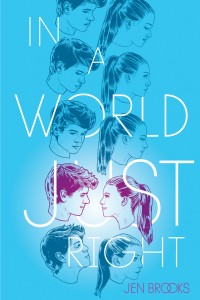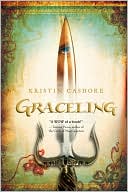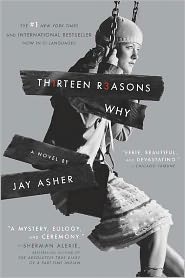September, 2011
Graceling and Thirteen Reasons Why
Have you ever read a book and thought, “That’s what I’m trying to accomplish with my writing.” I can’t recall how many times I’ve felt this way after reading a book, but I can name two times in recent memory: reading Kristin Cashore’s Graceling (which I’ve already mentioned in a previous post) and reading Jay Asher’s Thirteen Reasons Why, both YA (young adult) novels.
I can’t remember how I came across Graceling, but I think it might have been by reading Calico Reaction’s review. Graceling has a medieval-ish fantasy setting and is the story of Katsa, a young woman with a “grace” or special talent. Her grace is to kill, and her uncle, the king, forces her to be his thug by sending her against his enemies. The story follows Katsa as she rebels against her uncle and undertakes an epic journey to save the kingdoms from an evil graceling much more powerful than she. Thought-provoking questions about power, its use and abuse, pervade the story, as does the adolescent’s search for identity. Katsa must discover the true nature of her grace and make a decision on how she is going to use it. Of course, as with most good YA, there’s also a compelling love story.
I do remember how Thirteen Reasons Why came to my attention. My grad school program requires all members to read a common book for each residency. One term, the book chosen was Thirteen Reasons Why. Although I didn’t attend that particular residency, the book sounded intriguing, and I decided to pick it up. Thirteen Reasons Why is set in modern day (and is mainstream, not fantasy) and follows Clay Jensen, a high school student whose classmate, Hannah Baker, committed suicide only weeks before. He comes home one day to find a set of audiotapes in a box. He quickly learns that the tapes were recorded by Hannah before she died and are her account of the thirteen reasons why she committed suicide. Clay has received the tapes because his name is in them.
Thirteen Reasons Why is told from Clay’s point of view, but his thoughts and actions as he listens to the tapes are interwoven with Hannah’s narrative. The story is heart-wrenching, and by the end the message is abundantly clearpeople need to think about their actions and need to work on performing kindnesses because you never know how another person might be suffering. Clay, a boy most parents would love to call “son,” is a good character to illustrate the message.
As far as my writing goes, I consider both of these books inspirations. Graceling is a YA book, but it’s tone is more straight fantasy than YA and the hefty questions of power are not typical YA fodder, so it was my inspiration for the very difficult task of completing my revision of Wishstone for a YA audience. Thirteen Reasons Why gave me some confidence that I can write a novel set in modern day. Since my first novel is set in outer space thousands of years in the future and my second novel is set in ancient Greece thousands of years in the past, I was doubting I had the skills to pull off modern day YA. I didn’t think a character I would enjoy spending a novel writing would appeal to a YA audience. Sometimes I feel YA characters in books are portrayed as the adults who write YA tend to see them, rather than how they are. I’m frequently dismayed by how YA characters in other media are portrayed as caricatures. Clay Jensen, however, is a thoughtful character who, I feel, has all the appropriate reactions to what he hears on Hannah’s tapes. He felt much more real to me than any YA character I’ve encountered in a long time.
Moral of the story: my current project is a YA fantasy set in modern day. I’m sure there’ll be updates . . .
Speak up:
4 comments| TAGS:
inspiration, Jay Asher, Kristin Cashore, Thirteen Reasons Why, Wishstone, YAJust checking email subscriptions
Still working on making this website do what I want. Hopefully this will show up in my email.
Speak up:
1 commentWhere I’m at Part 3: agent search for Wishstone
I finished Wishstone a few years ago as a fantasy novel set in ancient Greece. I pitched it to exactly one agent, an agent who many authors dream of calling theirs. She requested sample chapters and sent a personal, professional, and helpful rejection a couple of weeks later.
It was around this time that my husband and I were trying to have a child. I will not share the details of those years, but let it suffice to say there were a lot of doctors, procedures, hopes, and disappointments, disappointments, disappointments. It was all I could do to keep my teaching career (and myself) from falling apart. I did not write.
After (hooray!) my son was born (well, months laterI was pretty busy with him for a while), I decided to revisit Wishstone. By this time there had been a dramatic change in the world of young adult literature. I was still in touch with friends from the Writing Popular Fiction program. They knew that my stories centered on teenage protagonists, so they suggested Wishstone might be better suited for this expanding young adult market. I had serious doubts. First of all, it had been a huge leap for me to write a fantasy at all. Although the lines between science fiction and fantasy often blur and they require some similar skills, I had never been interested in writing about magic. Likewise I had always considered myself as a writer for people like myself, i.e. adults who had grown up immersed in a spec fic world. Writing for young adults requires a particular talent for resonating with people who have fewer years of life experience and interests/needs I have (mostly) outgrown. I did not think I could do it.
Then I read Kristin Cashore’s Graceling. (Kristin Cashore, if you ever read this, thank you for being the writer you are.) Graceling is marketed as young adult. The story addresses themes such as the use and abuse of power, personal responsibility, and redemption. It is a coming-of-age story to be sure, but it is not filled with the angst I associated with young adult literature. Reading Graceling made me think that maybe I could convert Wishstone.
I returned to Seton Hill’s Writing Popular Fiction program for a second degree. They converted their MA program to an MFA program, which interested me because it would give me an additional credential to seek a teaching position in higher education. I revised Wishstone as my MFA thesis by cutting the POV of the 42-year-old man and leaving the entire story, minus the prologue, in the POV of the 16-year-old girl. I also added a love story to replace the one I lost by refocusing the POV.
I’m in the process of submitting Wishstone right now. This summer I revisited Prosorinos to see if it could get the same YA conversion as Wishstone, but it’s complexity, I think, makes that impossible.
So, since I’m waiting to hear about Wishstone, I’ve started this website and have begun work on a completely new novel. I’ll keep you posted . . .
Speak up:
comment| TAGS:
In Your Write Mind, Kristin Cashore, MFA, Seton Hill University, thesis, where I'm at, Wishstone, Writing Popular Fiction program, YAWhere I’m at Part 2: my agent submissions for Prosorinos
While still maintaining a grueling pace as a teacher, I managed to send Prosorinos, my first novel, on submission. I queried 14 agents. Here are my stats:
form letter rejections: 8
requests for partials: 3
requests for full: 1
no response: 2
I queried eleven of the top agents representing science fiction and three young agents building client lists. One of those young agents I actually queried in a pitch session at a conference (as opposed to mailing the query), and she requested one of those three partials. She later rejected it saying the subject matter was too dark for her.
That leaves one full request and two partials. One agent starting her own agency (she had worked at one of the big houses in New York) asked for a partial. We exchanged a couple of emails leading to a request for the full. It took many months of waiting to hear (as I remember it, close to a year) before I sent her an email requesting an update on the manuscript’s status. She did not respond. A little time passed and I emailed again. Again no response. To this day I have not received a response from this agent who had my full manuscript.
One of the partials went to another young agent. I followed her on her blog, over time learning that her personality might not be ideal for me to work with, so I didn’t send a follow-up. It didn’t matter. After one and a half years (yes YEARS) she sent me a rejection.
The part that slays me is that the other partial was requested by a very successful and highly regarded agent. She requested the partial exclusively, but since I already had a partial and a full out to other agents, I never did send her my sample chapters. Back then, I was a noob in every sense of the writing word, and I didn’t know how to handle the situation other than to continue waiting on the agents who had my stuff. Knowing what I now know, I would have done things so differently.
The consequence is that I never sent out Prosorinos to other agents. I had waited so long and lost so much confidence that I decided it would be best just to write another novel. A shorter novel more easily sold. I figured Prosorinos would still be there if I could attract an agent with my new novel. Thus, Wishstone was born.
On to next post . . .
Speak up:
comment| TAGS:
agents, manuscript request, manuscript submission, Prosorinos, where I'm at, WishstoneWhere I’m at Part 1: from teaching to my first thesis
This three-part post is probably more appropriate to the “About” button, but for my own sake, I’m starting by defining where I’m starting.
In high school I would have been surprised to be told I’d end up as an English teacher. I was pretty set on a career in science. I did, however, enjoy English and took electives in creative writing and journalism because I liked to write. It didn’t matter much to my career plans at the time that I won a major book award as a junior and a major English achievement award as a senior. I was accepted at Dartmouth, and I was going to be a biochemistry major with a future in cancer research.
Then in my sophomore spring, the deadline for Dartmouth students to declare their majors, I took a course on contemporary issues in education. It changed everything. Once I decided I wanted to teach, it suddenly became clear that the subject I needed to teach was English. I did the whole English major and education minor in my final two years. I got a job and taught English for fourteen years.
Throughout my public school teaching, I sometimes regretted that I didn’t choose a medical research path, especially when it seemed like all the care I gave and work I did went unappreciatedor worse, actively railed against. (Many of my students, and some of their parents, didn’t feel the same way about plagiarism/cheating that I did.) For the most part, though, I really enjoyed my job and was content to teach and coach track and field, and advise a class and a club, and serve on committees, and mentor new teachers, and all the other things that went along with my teaching life.
Where I worked, a teacher could receive a pay raise in three ways: 1) yearly contracted cost-of-living increases, 2) moving up a step (which means a pay raise for each of the first few years teaching until you reach a particular year), 3) becoming more educated. I stood to gain a bit of salary by getting a master’s degree, which I didn’t mind doing since I enjoy being a student. The problem was that a traditional degree would mean a lot of time commuting from where I lived, and I already worked a six-day week from dawn until, often, into the dark.
I found a program at Seton Hill University called Writing Popular Fiction and wrote to the director asking how many graduates of the program were actually published. She replied that the program was pretty new so there weren’t any yet (or maybe she said there was oneit was a super low number either way). This was back in 2004. Seton Hill’s Writing Popular Fiction program is low residency, which means students only have to travel there for one week twice a year. The program is unique in that it stresses popular, as opposed to literary, fiction. Although I adore much literary fiction, I wanted to write a science fiction story, and the answers I had received to inquiries at other grad schools left me with the impression science fiction would not be accepted with open arms. At Seton Hill it was embraced. Now there are more published authors from the Writing Popular Fiction program (some award-winning ones and some with large national and international followings) than I can count.
Long story shortened, my experience at Seton Hill changed my life. Until that time, I had not really considered a writing career seriously. I didn’t know what a writer’s life entailed. I didn’t think I had enough talent. I graduated from Seton Hill with a completed science fiction novel of over 160,000 words. It’s title is Prosorinos, the name of the planet on which it’s set. I thought maybe I could be a writer.
On to the next post . . .


